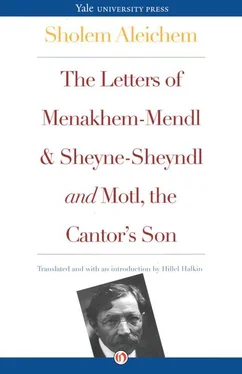“Oh, my God! That I should have lived to see the day! Here I thought my orphan was saying kaddish for his father and I find him on the roof stealing apples from a garden! May I be struck by lightning!”
The witch gave it to me good with her man’s voice:
“He deserves a beating, the scoundrel! A whipping! A flogging! Let him bleed! Let him learn what it means to be a thie—”
My mother didn’t let her finish the word.
“He’s an orphan!” she screamed. “A poor orphan!” She kissed the Doct’ress’ hand, begged her forgiveness, and swore by all that was holy that I would never do it again. As she lived and breathed!
“Make him swear never even to look at my garden!” thundered the Doct’ress without a drop of pity for an orphan.
“May I hope to die! May my eyes be poked out!” I said. I climbed down from the attic with my mother, who went on crying and scolding after everyone was gone.
“I ask you, what will become of you?” she said. Elye turned pale when she told him what had happened. It must have been from anger, because I heard her whisper that I was an orphan.
“I haven’t touched him,” Elye said. “I’d just like to know what will become of him. What?”
That’s what he said, my brother Elye, gritting his teeth and waiting for an answer. How am I supposed to know? Do you?
MY BROTHER ELYE GETS MARRIED
Congratulations! You haven’t heard the news? My brother Elye is getting married.
Hoop-de-doo! You should see the excitement. The whole town is buzzing with it. It’s all anyone is talking about. That’s what our neighbor Pesye says. She says it will be a grand wedding. Kasrilevke, she says, hasn’t seen such a wedding in years.
Why all the fuss? Well, the groom is an orphan and his mother is a widow: that’s one reason to celebrate. And you have to give my father credit. My father had a good reputation. Not that anyone ever thought of it when he was alive. But now that he’s dead, Peysi the cantor has become a great man. It’s awesome, the things people say about him. I’ve heard them tell my mother that the bride’s father should pay for the whole wedding because his son-in-law is Peysi the cantor’s boy. Elye is embarrassed by such talk. It makes him stroke his little beard like a grown-up.
He really is one now. He’s been one since his beard began to grow. I reckon that came from smoking. Elye took up smoking when my father died. His first cigarette gave him such conniptions that he nearly coughed to death. Now he lights right up and blows smoke through his nose. Big deal! You think I can’t do it too? I just don’t have any tobacco. I smoke paper, straw, whatever I can get hold of. Did I catch it from Elye when he found out! But how come he can and I can’t? It’s not my fault if I’m not nine years old yet. I promised him, I even swore on a Bible, that I’d lay off smoking for good. But how long does he expect me to keep my promise? Who doesn’t smoke nowadays?
The world is coming to an end! That’s what Pesye says. She just came back in a huff from Elye’s father-in-law. It looks bad. He’s found out his watch is missing. A good silver watch, a gift to his son-in-law! Still, it’s not as though Elye gambled it away. He sold it to pay for medicines and doctors. It’s no crime to try saving your father’s life.
That’s what Pesye said. But Elye’s father-in-law is no genius. What, he wants to know, does his watch have to do with anyone’s father? It’s not his lookout to support all the world’s fathers with his watches. Suddenly Elye has all the fathers in the world and they’ve all been given watches! Pesye says you can’t make a fur hat from a pig’s tail.
She’s talking about Yoyneh the bagel maker. That’s Elye’s father-in-law. He’s a simple soul, a baker. “He should bake bagels in his grave,” Pesye says. That’s only a joke. Or is it? Who would buy them if he baked them there?
He’s a rich man, Elye’s father-in-law. Pesye says he’s worth a fortune. She told him she would never marry into a family like his because she doesn’t like pigs. He put up with it because it’s best to hold your tongue when Pesye starts in on you. He was even ready to forget the watch if she’d lay off. But Pesye didn’t want to. Pesye wanted Yoyneh to buy Elye a new watch. Who ever heard, she said, of a young man getting married without a watch? Yoyneh the bagel maker couldn’t see what business it was of Pesye’s if his son-in-law had a watch or not. Pesye said it was her business because Elye is Peysi the cantor’s son and Yoyneh is a rich pig. That did it. “Go to hell!” Yoyneh said, slamming the door in Pesye’s face. “I’ll see you in hell’s ovens before me!” Pesye answered. “That’s where a baker like you belongs.”
My mother was terrified that Yoyneh would break the engagement. Pesye said not to worry. No one ever calls off an orphan’s wedding. And who do you think won? We did! Yoyneh the bagel maker bought Elye a new watch. It’s silver like the first and even better. He brought it over himself.
I’d give anything to own a watch like that. What would I do with it? First I’d take it apart to see what made it tick. And then? I’ll tell you. My mother wished Yoyneh many long years of life in which to buy Elye a gold watch. Then Yoyneh wished my mother many long years of life in which to marry off her youngest son. That’s me! I told her I wouldn’t mind getting married right now for a watch. She patted my cheek and said with tears in her eyes that a lot of water would flow under the bridge before my wedding. You can search me what my wedding has to do with bridges or why she has to cry.
A day doesn’t go by without her crying. She cries the way other people eat or pray. If the tailor brings Elye the wedding suit Yoyneh ordered, my mother cries. If Pesye bakes a honey cake for the wedding, she cries. Now the wedding is tomorrow and she’s crying. Maybe someone can explain to me where all those tears come from.
What a day! It’s late summer and the weather is late-summery. The sun no longer makes you sweat or want to jump in the river. It’s as soft and kissing-warm as a mother. The sky is spread out like a Sabbath tablecloth. The whole world is celebrating my brother Elye’s wedding.
There’s a fair in town today. It opened this morning. Fairs are always where you’ll find me. I’m crazy about them. Just look at all those Jews, shouting, sweating, swearing, hustling their customers, running around like chickens without heads — a real carnival! The peasants are in no hurry. They walk slowly with their hats pushed back, inspecting the merchandise. They touch it, haggle over it, have a fine time looking for bargains. Women in weird bonnets stick goods in the bosoms of their dresses when they think no one’s looking. But the Jews are wise to them and keep an eye out. When they catch one, they try shaking the goods loose. That’s when the fur begins to fly.
Once a peasant woman bought a candle in a church and stuck it in her bonnet. Some practical joker lit it without her knowing. The merchants saw and started to laugh. She didn’t know what the joke was and swore at them, and the more she swore the harder they laughed. It ended in a Jewish-Christian free-for-all. I tell you, it’s a carnival!
The best part of the fair is the horse market. It’s full of horses, whips, Gypsies, Jews, peasants, country squires. The noise is so out-of-this-world you could go deaf. The Gypsies shout foul language, the Jews clap their hands, the squires crack their whips, and the colts scamper like crazy. I like to watch horses and listen to horse talk. I’m dying for a colt of my own. I like everything little, puppies and kittens too. Baby pickles, potatoes, onions, heads of garlic, anything that’s small. Not piglets, though. I hate pigs even when they’re babies.
Читать дальше












